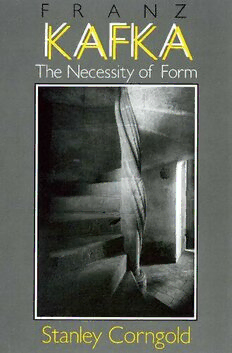
Franz Kafka: The Necessity of Form PDF
Preview Franz Kafka: The Necessity of Form
Franz Kafka The Necessity of Form ALSO BY STANLEY CORNGOLD BOOKS The Commentators' Despair: The Interpretation of Kafka's "Metamorphosis" The Fate of the Self: German Writers and French Theory EDITED WORKS Aspekte der Goethezeit (with Michael Curschmann and Theodore Ziolkowski) Ausgewahlte Prosa by Max Frisch The Metamorphosis by Franz Kafka Thomas Mann, 1875-1975 (with Richard Ludwig) FranzK afka The Necessity of Form by Stanley Corngold CORNELL UNIVERSITY PRESS • ITHACA AND LONDON Open access edition funded by the National Endowment for the Humanities/ Andrew W. Mellon Foundation Humanities Open Book Program. Copyright © 1988 by Cornell University All rights reserved. Except for brief quotations in a review, this book, or parts thereof, must not be reproduced in any form without permission in writing from the publisher. For information, address Cornell University Press, Sage House, 512 East State Street, Ithaca, New York 14850, or visit our website at cornellpress.cornell.edu. First published 1988 by Cornell University Press Library of Congress Cataloging-in-Publication Data Corngold, Stanley. Franz Kafka : the necessity of form. Includes index. 1.Kafka, Franz, 1883–1924. 2. Authors, Austrian—20th century—Biography. I. Title. PT2621.A26Z664 1988 833′.912 [B] 88-47721 ISBN-13: 978-0-8014-2199-0 (cloth) — ISBN-13: 978-0-8014-9768-1 (pbk.) The text of this book is licensed under a Creative Commons Attribution-NonCommercial-NoDerivatives 4.0 International License: https://creativecommons.org/licenses/by-nc-nd/4.0/ My whole being is directed toward literature; I have followed this direction unswervingly .. ., and the moment I abandon it I cease to live.E verything I am, and am not, is a result. ... It is the earthly reflection of a higher necessity. FRANZ KAFKA, Letters to Felice (1913) From the West all content acquires meaning from form only, one's gaze is fixed only on form, courtesy of Flaubert .... It became the feature of apocalypse: the task of reality pure and simple, the transposition of all substance into form, into the formula. GOTTFRIED BENN, "Ziichtung I" He does not live for the sake of his personal life; he does not think for the sake of his personal thoughts.I t seems to him that he lives and thinks under the compulsion of a family, which, it is true, is itself superabundant in life and thought, but for which he constitutes, in obedience to some law unknown to him, a formal necessity. FRANZ KAFKA, The Great Wall of China (1920) Contents Preface lX Acknowledgments XVll Abbreviations for Kafka Citations XlX Introduction I PART I KAFKA'S CAREER I '"You,' I Said . . ." : Kafka Early and Late 13 2 The Hermeneutic of "The Judgment" 24 3 The Metamorphosis: Metamorphosis of the 47 Metaphor 4 Metaphor and Chiasm 90 5 Kafka's Double Helix ms PART II KAFKA'S CONTEXT 6 Kafka, Nietzsche, and the Question of Literary 139 History 7 Consternation: The Anthropological Moment in Prose Fiction (Cervantes, Flaubert, Kafka) Vll Contents 8 The Curtain Half Drawn: Prereading in Flaubert 203 and Kafka 9 The Trial/"In the Penal Colony": The Rigors of 228 Writing IO Kafka as Expressionist 250 EXCURSUS ON METHOD II Principles of Kafka Interpretation 291 12 "The Pure Expression": An Exemplary Reading 299 of Kafka Index 313 Vlll Preface To say what Kafka's work means is to say more than one can, if meanings depend on descriptions of experience, having beginnings and ends. For here, in Holderlin's words, "beginning and end no longer allow themselves to be coupled together like rhymes. "1 Kafka himself doubted that "TheJudgment"-the story he loved the best meant anything "straightforward" and "coherent. "2 But the want of such meaning should not suggest something fugitive or arabesque about his achievement. Kafka's work is informed by a literally cabalistic stringency that draws reading after reading to itself-in cluding readings based on experience. This is a fact about its power to invite disclosure by experience, not its need to be improved by it. Indeed, recent studies of Kafka have been less and less concerned with reproducing the description of personal experience that Kafka's work purportedly makes. In other words, Kafka is rarely read today as if he were writing in the discursive system of I 800, in which, as Friedrich I. This sentence is Friedrich HOlderlin's description of Nature in dissolution; see Siimtliche Werke (Stuttgart: Kohlhammer, 1961), 5:220. Sources for the foregoing epigraphs are LF 313; Gottfried Benn, "Ziichtung I," in Gesammelte Werke: Essays, Reden, Vortriige (Wiesbaden: Limes, 1959), 1:217; GW 269. 2. In a letter to Felice Bauer dated June 2, 1913, Kafka wrote: "Can you discover any meaning in 'The Judgment' -some straightforward, coherent meaning that one could follow? I can't find any, nor can I explain anything in it" (LF 265). Silvio Vietta notes, "In Kafka's stories 'meaning' itself is thematized"; see "Franz Kafka, Expres sionism, and Reification," trans. Douglas Kellner, in Passion and Rebellion: The Expres sionist Heritage, ed. Stephen Eric Bronner and Douglas Kellner (South Hadley, Mass.: Bergin, 1983), p. 2ro. IX
